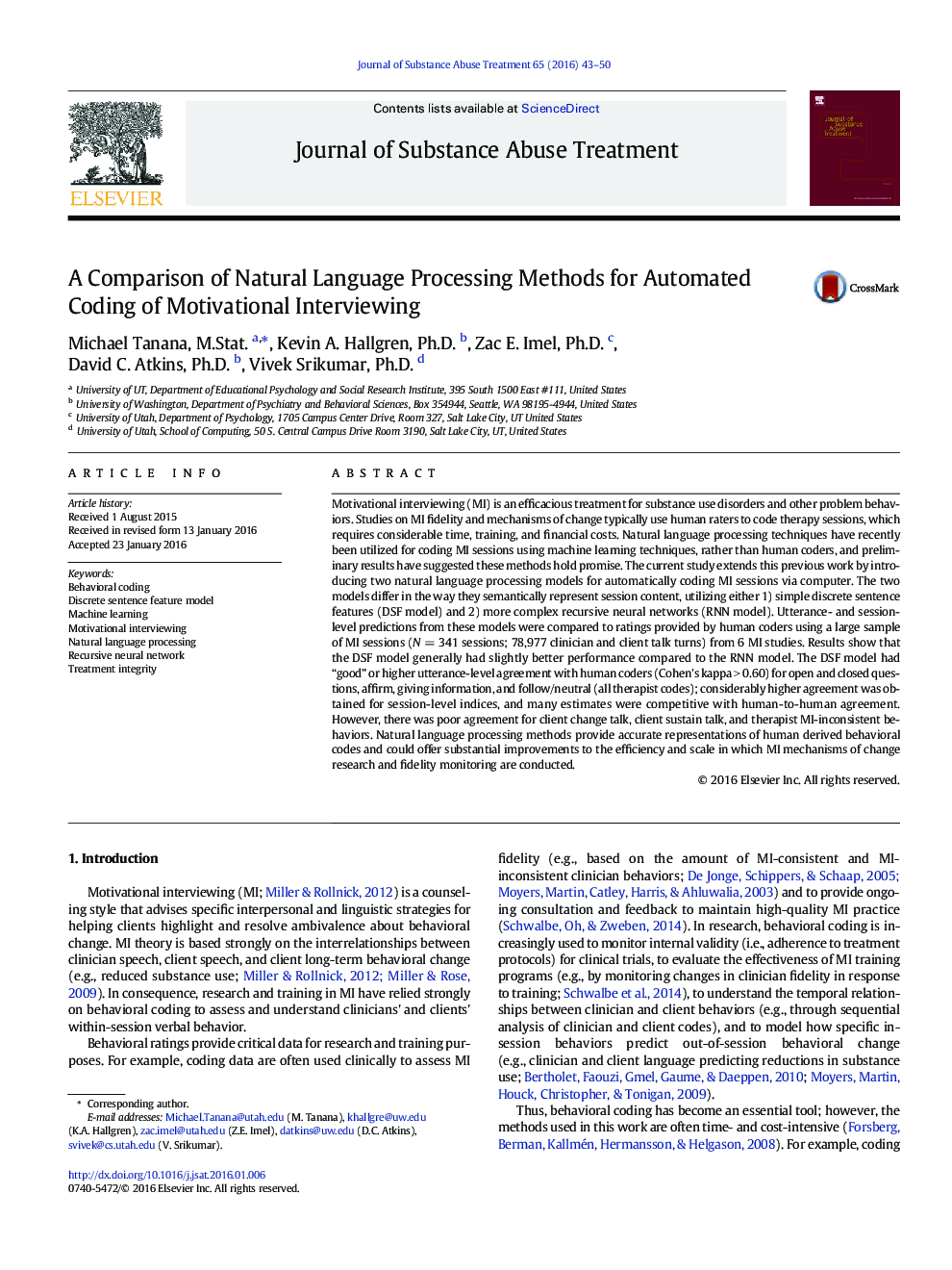| کد مقاله | کد نشریه | سال انتشار | مقاله انگلیسی | نسخه تمام متن |
|---|---|---|---|---|
| 6802374 | 543564 | 2016 | 8 صفحه PDF | دانلود رایگان |
عنوان انگلیسی مقاله ISI
A Comparison of Natural Language Processing Methods for Automated Coding of Motivational Interviewing
ترجمه فارسی عنوان
مقایسه روشهای پردازش زبان طبیعی برای رمزگذاری خودکار مصاحبه انگیزشی
دانلود مقاله + سفارش ترجمه
دانلود مقاله ISI انگلیسی
رایگان برای ایرانیان
کلمات کلیدی
برنامه نویسی رفتاری، مدل حکم گسسته، فراگیری ماشین، مصاحبه انگیزشی، پردازش زبان طبیعی، شبکه عصبی بازگشتی یکپارچگی درمان،
موضوعات مرتبط
علوم زیستی و بیوفناوری
علم عصب شناسی
روانپزشکی بیولوژیکی
چکیده انگلیسی
Motivational interviewing (MI) is an efficacious treatment for substance use disorders and other problem behaviors. Studies on MI fidelity and mechanisms of change typically use human raters to code therapy sessions, which requires considerable time, training, and financial costs. Natural language processing techniques have recently been utilized for coding MI sessions using machine learning techniques, rather than human coders, and preliminary results have suggested these methods hold promise. The current study extends this previous work by introducing two natural language processing models for automatically coding MI sessions via computer. The two models differ in the way they semantically represent session content, utilizing either 1) simple discrete sentence features (DSF model) and 2) more complex recursive neural networks (RNN model). Utterance- and session-level predictions from these models were compared to ratings provided by human coders using a large sample of MI sessions (N = 341 sessions; 78,977 clinician and client talk turns) from 6 MI studies. Results show that the DSF model generally had slightly better performance compared to the RNN model. The DSF model had “good” or higher utterance-level agreement with human coders (Cohen's kappa > 0.60) for open and closed questions, affirm, giving information, and follow/neutral (all therapist codes); considerably higher agreement was obtained for session-level indices, and many estimates were competitive with human-to-human agreement. However, there was poor agreement for client change talk, client sustain talk, and therapist MI-inconsistent behaviors. Natural language processing methods provide accurate representations of human derived behavioral codes and could offer substantial improvements to the efficiency and scale in which MI mechanisms of change research and fidelity monitoring are conducted.
ناشر
Database: Elsevier - ScienceDirect (ساینس دایرکت)
Journal: Journal of Substance Abuse Treatment - Volume 65, June 2016, Pages 43-50
Journal: Journal of Substance Abuse Treatment - Volume 65, June 2016, Pages 43-50
نویسندگان
Michael M.Stat., Kevin A. Ph.D., Zac E. Ph.D., David C. Ph.D., Vivek Ph.D.,
